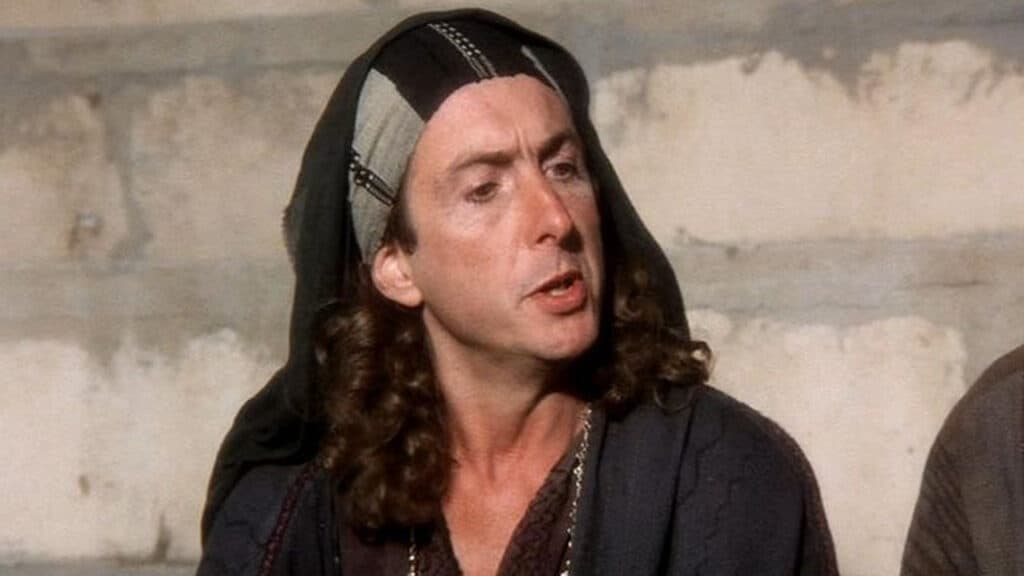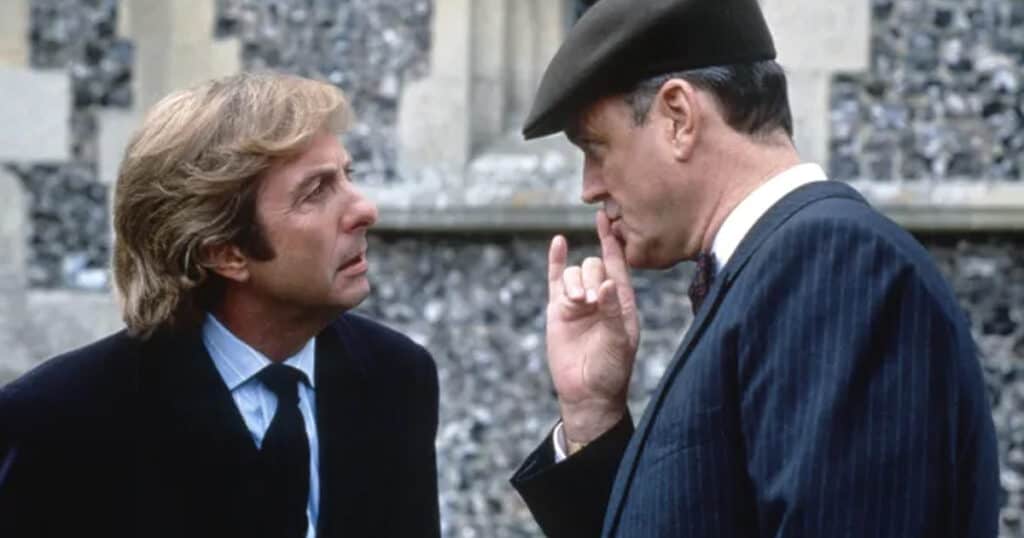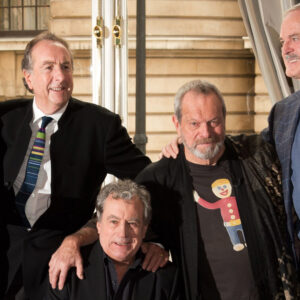On August 12, 2012, 750 million sets of eyes were entranced by the closing ceremony of the London Olympics, a spectacle celebrating the host city and nation. From under the stage emerged Eric Idle, surrounded by nuns on roller skates and Roman soldiers. Idle led the audience in a rendition of his hit comedy anthem “Always Look on the Bright Side of Life”. The live crowd joined in on every word, even thirty years after the song’s initial release.
Since the 1960s, Eric Idle has reminded us to “Always Look on the Bright Side of Life”. More than that, he has made doing so a lot easier with his unique brand of comedy and creativity. Idle rose to prominence with his fellow Pythons in the late 1960s and was a staple of screens big and small in the decades to follow. He has largely stepped away from the spotlight in recent years, which begs the question, “What happened to Eric Idle?” It’s nice to think he’s embraced the comforts of retirement, but the truth may not be quite so rosy.
But we can’t know where we’re going without knowing where we’ve been, so we’ll start where we always do: in the beginning, where the beginning began to begin.
Eric Idle was born in South Shields, England, on March 29, 1943. His mother was a nurse, and his father served in the Royal Air Force but was killed in a road accident when Eric was only 2 years old. Idle’s mother did not take his father’s death well and effectively abandoned him from that point on. He was in the care of his grandparents until 1950 when his mother left him at Royal School Wolverhampton, a live-in facility primarily for boys whose fathers had been killed in World War II. He performed well enough in school to enter Pembroke College, Cambridge, where he earned his Bachelor of Arts in English Literature. It was around this time he met his future Monty Python colleagues.
Also in 1965, Eric Idle began working for the BBC, appearing in TV Movies Alice in Wonderland and Isadora and writing for numerous radio and television programs. His first big hit was the family sketch comedy show Do Not Adjust Your Set, which he wrote for and appeared in from 1967-1969. The show’s success, which also featured Terry Gilliam, Terry Jones, and Michael Palin, earned Idle and the rest of the Pythons the opportunity to showcase their talents as a group in Monty Python’s Flying Circus, which ran from 1969-1974.
It’s impossible to overstate Eric Idle’s contributions to Flying Circus. He brought memorable writing, catchy composing, and versatile performing to the sketch comedy series. He was always committed and enthusiastic, which was plain to see in the “Nudge Nudge” sketch, which featured a great buildup to a classic punchline. His sharp writing shined in “Marriage Guidance Counselor,” his measured delivery balanced the great inversion sketch “Working Class Playwright.”
1971’s And Now for Something Completely Different was a reproduction of some of the best Flying Circus sketches, intended to introduce Monty Python to the American audience. Idle is featured heavily as a writer and performer, and he displays his versatility by portraying a lawyer, a mountaineer, a lumberjack, and a fairy, among other characters. He also lent his iconic voice to voiceover and narration work.
Monty Python produced a similar effort for the German market in 1972 in the form of Monty Python’s Fliegender Zirkus. Reports vary about the Pythons’ comfort with the German language, but the final results and the fact that the second episode is in English could allude to that comfort being low.

Eric Idle and the rest of the Pythons produced the 1975 feature film Monty Python and the Holy Grail. Music industry connections made the movie possible, as it was almost entirely funded by record labels and musicians from Led Zeppelin, Pink Floyd, and Jethro Tull. Eric Idle played multiple roles in the film, notably Sir Robin the-not-quite-so-brave-as-Sir-Lancelot. Sir Robin is the only knight created anew for the movie rather than derived from Arthurian lore. And the brave part of his name is definitely ironic, which Idle played into perfectly. If only he knew the capital of Assyria. Holy Grail was a huge success upon release, and its stature has only grown since, as it’s considered by many to be one of the best comedy films of all time.
Idle ventured without his Python cohorts to create Rutland Weekend Television, which ran on BBC2 from 1975 to 1976. It was a sketch comedy show parodying low-budget regional television and pretty much everything else under the sun. Eric Idle served as the primary lead on the show, portraying characters like a sadistic judge who sentences people to death for trivial offences and narrating the entire history of the world in three minutes. His friend George Harrison of the Beatles featured in the show’s Christmas special.
Speaking of the Beatles, one of the most enduring aspects of Rutland Weekend Television was the creation of The Rutles. This Beatles parody band would go on to feature in mockumentaries The Rutles: All You Need is Cash in 1978 and return in 2003 for The Rutles 2: Can’t Buy Me Lunch. Idle portrayed Dirk McQuickly, a pastiche of Paul McCartney. Idle’s performance as McQuickly displayed his comedic and musical talents, along with his love for the Beatles and his friend George Harrison.
Idle would need a little help from his friend when it came time to fund Monty Python’s next venture: 1979’s Life of Brian. Despite the success of Holy Grail, the studio dropped Life of Brian just days before it went into production, owing to the controversial subject matter. Idle complained of the predicament to his friend George Harrison, but never could have reasonably expected what happened next. Harrison mortgaged his home, and his business manager Denis O’Brien mortgaged his offices, and the pair formed HandMade Films and fully funded Life of Brian.
The film would go on to box office success, earning over 5 times its budget and earn wide regard as another Monty Python film among the best comedies of all time. It’s original and memorable, and its themes are explored with a deft hand. Eric Idle helped pen the film and portrayed multiple roles. His most enduring legacy from the film is his writing and performance of “Always Look on the Bright Side of Life”, which persists as an anthem for optimism. Idle would celebrate Life of Brian in the form of the live oratorio Not the Messiah (He’s a Very Naughty Boy) in 2007 and record it for television in 2009.
Eric Idle and the other Pythons performed Monty Python Live at the Hollywood Bowl in 1982, primarily featuring sketches Flying Circus made famous. Idle notably takes the lead in “The Lumberjack Song”, for this rendition.
1983 saw the release of Monty Python’s The Meaning of Life, a hilarious exploration of…well…the meaning of life through its various stages. Idle’s performances contribute to the irreverence and absurdity of the film, and the soundtrack he wrote, composed, and performed is among the movie’s most memorable aspects.
Idle made his mark in National Lampoon’s European Vacation in 1985, playing a memorable role as a bike rider inadvertently struck by Clark Griswold’s car. Don’t worry, it was just a flesh wound.
He brought his trademark quirkiness and charm to the comic relief character Wreck-Gar in the animated film The Transformers: The Movie. Unfortunately, scheduling conflicts prevented him from reprising the role for Transformers Animated in 2007.
In 1989, Eric Idle led the short-lived supernatural sitcom Nearly Departed. Despite his usual wit and charm, the show failed to attract an audience. That same year, Idle featured in fellow Python Terry Gilliam’s production of The Adventures of Baron Munchausen. His performance aligned well with the film’s whimsical absurdist tone, with the two characters he portrays being confused for each other. Alas, tragedy also struck in 1989, when original Python member (and the most gifted actor of the bunch) Graham Chapman passed away at only 48 years old.

Idle’s career went into pretty high gear in the early nineties, with his British comedy Nuns on the Run a surprise hit, leading to a follow-up, Splitting Heirs (which we recently dug into), co-starring fellow Python member John Cleese.
Idle also played a prominent role in 1995’s Casper as the lackey to the main antagonist, injecting comedic flair into what would otherwise be a rather dour kids’ movie.
In 1996, Idle appeared in The Wind in the Willows (released in the United States as Mr. Toad’s Wild Ride), directed by Monty Python co-founder Terry Jones. Though not a financial success, the film and Eric Idle’s performance as Rat were well-regarded by critics and audiences.
He lent his voice to the animated series Hercules from 1998 to 1999, voicing Mr. Parentheses, the principal of Prometheus Academy.
Idle brought his trademark eccentricity to the role of Ian Maxtone-Graham in the sitcom Suddenly Susan for the show’s final season from 1999 to 2000. He voiced Waddlesworth in the Oscar-nominated 102 Dalmatians in 2000, a Macaw with a canine identity crisis.
From 2003 to 2012, Idle voiced a recurring character on The Simpsons named Declan Desmond, a documentary filmmaker not-so-subtly based on David Attenborough. He served as the narrator for 2004’s Ella Enchanted, enchanting the tale with his distinctive voice and lending it humor and heart.
Arguably Idle’s most successful venture is the musical Spamalot, a Broadway show based on Monty Python’s Holy Grail, which debuted in December of 2004. The show garnered three Tony Awards, including Best Musical. In 2014, Eric Idle produced Monty Python Live (mostly) – One Down Five to Go, a mostly live stage show aimed at recouping lost funds from a lawsuit. The performances, featuring classic sketches and songs, sold out rapidly.
In 2018, Idle released his memoir: “Always Look on the Bright Side of Life: A Sortabiography,” offering a funny and candid account of his career and friendships.
In 2019, Idle was diagnosed with pancreatic cancer but survived thanks to early detection and surgery. He has since become an advocate for cancer research funding and screening.
Despite attempts to produce a Spamalot movie in 2021, it was reportedly vetoed by other Pythons.
In 2024, nearing his 81st birthday, Idle expressed his need to keep working for a living, emphasizing his engagement in writing and creating a new show. In this rant, he took issue with how Monty Python’s finances were being handled by Terry Gilliam’s daughter, Holly, writing: “We own everything we ever made in Python, and I never dreamed that at this age the income streams would tail off so disastrously. But I guess if you put a Gilliam child in as your manager, you should not be so surprised. One Gilliam is bad enough. Two can take out any company.”
This prompted a stern (but possibly tongue-in-cheek) rebuttal from John Cleese, in which he defended Holly and wrote about Idle, “we always loathed and despised each other, but it’s only recently that the truth has begun to emerge.” While everyone would like to think the members of Python just rode off into the sunset to enjoy their retirement, the truth isn’t always quite so simple.
Whatever the case may be, throughout his six-decade career, Eric Idle has been not only a master of comedy but also a generous supporter of various causes and charities, including Comic Relief, Amnesty International, and cancer research. He remains an inspiration to many comedians and artists worldwide, and even if he may not be as well-off in retirement as we all assumed, his place in the pantheon of comic greats is assured. He’s a living legend, and we’re lucky to have him.




















Follow the JOBLO MOVIE NETWORK
Follow us on YOUTUBE
Follow ARROW IN THE HEAD
Follow AITH on YOUTUBE